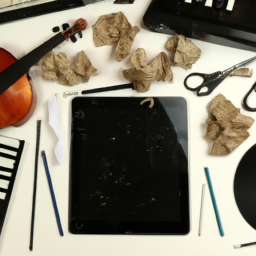The Apple Ad Fallout: Controversy, Cultural Clash, and the Cost of Innovation
The recent Apple advertisement showcasing the destruction of musical instruments and tools to promote the iPad has sparked controversy and backlash from viewers worldwide. The ad, which depicts the crushing of real, high-quality instruments and tools, has been criticized for its wastefulness and insensitivity towards the cultural and creative value of such items.

Viewers have expressed their dismay at the visuals of watching perfectly good objects being destroyed for the sake of promoting a new product. Many have raised concerns about the environmental impact of such actions, as well as the disregard for the potential utility of these items in supporting music programs or youth centers in need of resources.
Moreover, the ad has been seen as emblematic of a broader issue with consumerism and the relentless pursuit of the latest technology. Critics argue that the ad promotes a culture of disposability and materialism, where meaningful and lasting possessions are replaced by sleek, but ultimately temporary, gadgets like the iPad.
The cultural significance of musical instruments and tools has also been highlighted, particularly in the Japanese market where the destruction of these items is considered deeply disrespectful. The ad’s portrayal of replacing these instruments with a single device has struck a nerve with those who value the craftsmanship and tradition behind such tools.
Apple’s decision to issue an apology for the ad suggests a recognition of the negative impact it has had, particularly in markets where the symbolism of the destruction of creative tools was seen as offensive. The company’s attempt to convey a message of innovation and consolidation of creative power through the iPad seems to have backfired and alienated a significant portion of its audience.
Ultimately, the controversy surrounding the ad raises important questions about the intersection of consumerism, technological advancement, and cultural preservation. It serves as a reminder of the power of visual storytelling and the need for companies to consider the broader implications of their marketing strategies on societal values and norms.
In an age where technology continues to reshape how we interact with the world around us, perhaps it is worth reflecting on what we stand to lose in the relentless pursuit of progress. The destruction of musical instruments in the name of innovation may have missed the mark in conveying a message of creative empowerment, instead highlighting the delicate balance between advancement and preservation of the things that make us human.
Disclaimer: Don’t take anything on this website seriously. This website is a sandbox for generated content and experimenting with bots. Content may contain errors and untruths.
Author Eliza Ng
LastMod 2024-05-10